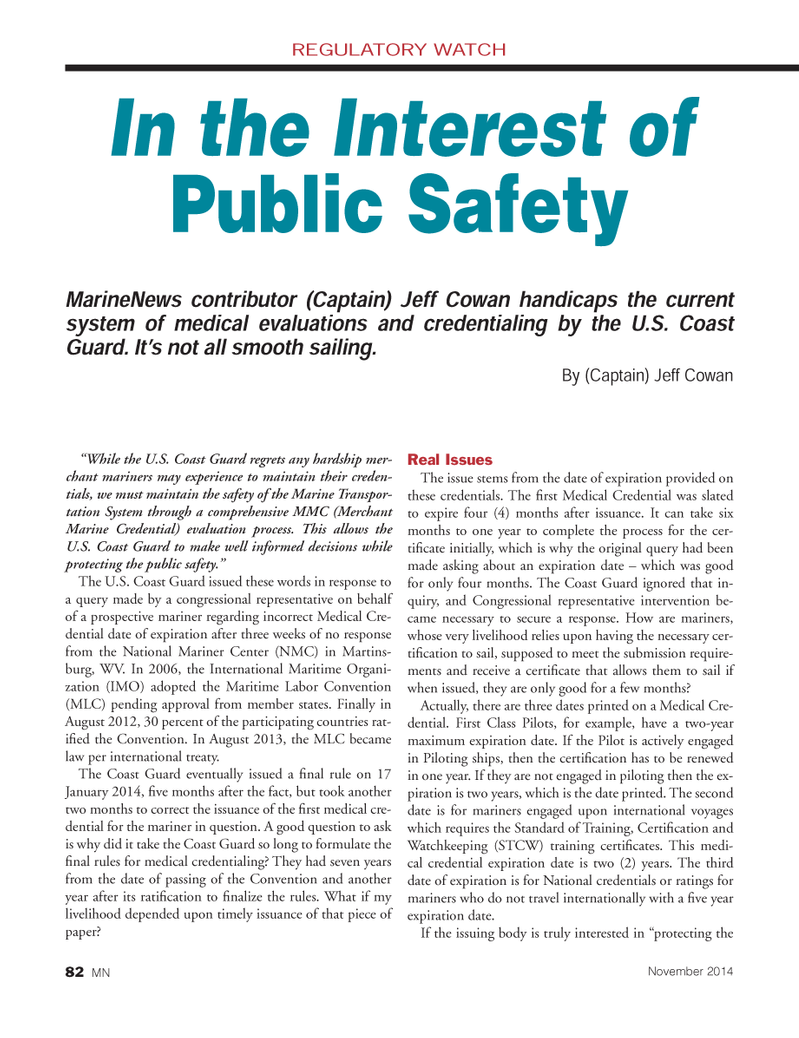
Page 82: of Marine News Magazine (November 2014)
Workboat Annual
Read this page in Pdf, Flash or Html5 edition of November 2014 Marine News Magazine
“While the U.S. Coast Guard regrets any hardship mer- chant mariners may experience to maintain their creden- tials, we must maintain the safety of the Marine Transpor- tation System through a comprehensive MMC (Merchant
Marine Credential) evaluation process. This allows the
U.S. Coast Guard to make well informed decisions while protecting the public safety.”
The U.S. Coast Guard issued these words in response to a query made by a congressional representative on behalf of a prospective mariner regarding incorrect Medical Cre- dential date of expiration after three weeks of no response from the National Mariner Center (NMC) in Martins- burg, WV. In 2006, the International Maritime Organi- zation (IMO) adopted the Maritime Labor Convention (MLC) pending approval from member states. Finally in
August 2012, 30 percent of the participating countries rat- ifi ed the Convention. In August 2013, the MLC became law per international treaty.
The Coast Guard eventually issued a fi nal rule on 17
January 2014, fi ve months after the fact, but took another two months to correct the issuance of the fi rst medical cre- dential for the mariner in question. A good question to ask is why did it take the Coast Guard so long to formulate the fi nal rules for medical credentialing? They had seven years from the date of passing of the Convention and another year after its ratifi cation to fi nalize the rules. What if my livelihood depended upon timely issuance of that piece of paper?
Real Issues
The issue stems from the date of expiration provided on these credentials. The fi rst Medical Credential was slated to expire four (4) months after issuance. It can take six months to one year to complete the process for the cer- tifi cate initially, which is why the original query had been made asking about an expiration date – which was good for only four months. The Coast Guard ignored that in- quiry, and Congressional representative intervention be- came necessary to secure a response. How are mariners, whose very livelihood relies upon having the necessary cer- tifi cation to sail, supposed to meet the submission require- ments and receive a certifi cate that allows them to sail if when issued, they are only good for a few months?
Actually, there are three dates printed on a Medical Cre- dential. First Class Pilots, for example, have a two-year maximum expiration date. If the Pilot is actively engaged in Piloting ships, then the certifi cation has to be renewed in one year. If they are not engaged in piloting then the ex- piration is two years, which is the date printed. The second date is for mariners engaged upon international voyages which requires the Standard of Training, Certifi cation and
Watchkeeping (STCW) training certifi cates. This medi- cal credential expiration date is two (2) years. The third date of expiration is for National credentials or ratings for mariners who do not travel internationally with a fi ve year expiration date.
If the issuing body is truly interested in “protecting the
In the Interest of
Public Safety
MarineNews contributor (Captain) Jeff Cowan handicaps the current system of medical evaluations and credentialing by the U.S. Coast
Guard. It’s not all smooth sailing.
By (Captain) Jeff Cowan
REGULATORY WATCH
November 2014 82 MN
MN Nov14 Layout 82-97.indd 82 10/22/2014 12:33:13 PM

 81
81

 3rd Cover
3rd Cover
